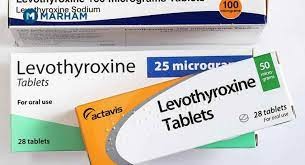A nurse is caring for four clients for whom she has to administer oral medications in the morning. The nurse should administer which of the following medications before breakfast?
Levothyroxine
Digoxin
Divalproex
Mycostatin mouthwash
The Correct Answer is A
A. Levothyroxine
Correct Answer: Levothyroxine should be administered before breakfast.
Explanation: Levothyroxine is a synthetic thyroid hormone used to treat hypothyroidism. It needs to be taken on an empty stomach, at least 30 minutes before eating, to ensure proper absorption. Food can interfere with its absorption, especially foods containing calcium, iron, and fiber.
B. Digoxin
Incorrect Explanation: Digoxin does not need to be administered before breakfast.
Explanation: Digoxin is a medication used to treat heart conditions like congestive heart failure and atrial fibrillation. It doesn't have specific instructions regarding administration in relation to meals. It's important to administer digoxin consistently at the same time every day, but it doesn't need to be taken specifically before or after breakfast.
C. Divalproex
Incorrect Explanation: Divalproex does not need to be administered before breakfast.
Explanation: Divalproex is used to treat conditions like epilepsy and bipolar disorder. It can be taken with or without food. While taking it with food might reduce the likelihood of stomach upset, there's no requirement to take it specifically before breakfast.
D. Mycostatin Mouthwash
Incorrect Explanation: Mycostatin mouthwash is not related to breakfast timing.
Explanation: Mycostatin is an antifungal medication used to treat fungal infections in the mouth (oral thrush). Its administration is not linked to meal times. It's typically swished around in the mouth and then swallowed or spit out, depending on the specific instructions provided by the healthcare provider.

Nursing Test Bank
Naxlex Comprehensive Predictor Exams
Related Questions
Correct Answer is A
Explanation
A. You do not need to lose consciousness to suffer a concussion.
This statement is true. Concussion is a type of traumatic brain injury (TBI) that can occur without loss of consciousness. Many concussions happen without the person losing consciousness at all.
B. You will suffer permanent brain damage.
This statement is not necessarily true. While some concussions can lead to lasting effects, not all cases result in permanent brain damage. The severity and long-term effects of a concussion can vary widely.
C. We encourage fluids after a concussion.
This statement is true. Adequate hydration is important after a concussion. Staying hydrated can help support the brain's recovery process.
D. Bleeding always occurs with a concussion.
This statement is not true. Concussion is defined by the disruption of normal brain function due to a blow or jolt to the head or body, and bleeding is not always a necessary component of a concussion. However, more severe head injuries could involve bleeding and would not be classified as just a concussion.
Correct Answer is A
Explanation
Type 1 diabetes mellitus is a condition where the body's immune system mistakenly attacks and destroys the insulin-producing cells in the pancreas. Individuals with type 1 diabetes require insulin therapy to manage their blood sugar levels. Since the question is about teaching an adolescent with type 1 diabetes, let's analyze each option:
A) Obtain an influenza vaccine annually:
This is a crucial recommendation. People with diabetes, including type 1 diabetes, have a higher risk of complications from infections, including influenza (the flu). The flu can lead to elevated blood sugar levels and potentially worsen diabetes control. Getting an annual influenza vaccine helps reduce the risk of getting the flu and its associated complications.
B) Take glyburide with breakfast:
Glyburide is a medication used to treat type 2 diabetes, not type 1 diabetes. It stimulates the pancreas to produce more insulin. Type 1 diabetes is characterized by a lack of insulin production, so taking glyburide would not be appropriate.
C) Administer glucagon for hyperglycemia:
Glucagon is a hormone used to raise blood sugar levels, typically in cases of severe hypoglycemia (low blood sugar). It is not used to treat hyperglycemia (high blood sugar) in type 1 diabetes. Instead, insulin administration is the primary method for managing high blood sugar levels.
D) Inject insulin in the deltoid muscle:
Insulin injections for individuals with type 1 diabetes are typically given in the subcutaneous fat, which is found just beneath the skin. The deltoid muscle is not a recommended site for insulin injections due to inconsistent absorption. The abdomen, thighs, and buttocks are commonly recommended injection sites.
Whether you are a student looking to ace your exams or a practicing nurse seeking to enhance your expertise , our nursing education contents will empower you with the confidence and competence to make a difference in the lives of patients and become a respected leader in the healthcare field.
Visit Naxlex, invest in your future and unlock endless possibilities with our unparalleled nursing education contents today
Report Wrong Answer on the Current Question
Do you disagree with the answer? If yes, what is your expected answer? Explain.
Kindly be descriptive with the issue you are facing.
